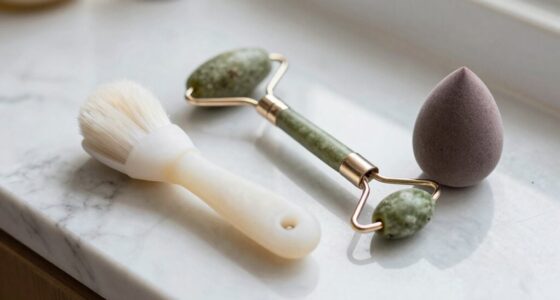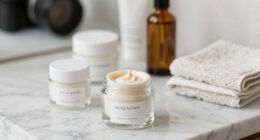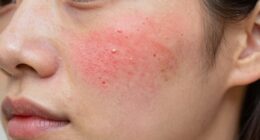During pregnancy, focus on using safe ingredients like aloe vera, coconut oil, and shea butter, which nourish your skin without harmful chemicals. Avoid retinoids, salicylic acid, certain essential oils, synthetic fragrances, and harsh chemicals that could pose risks to you and your baby. Choosing natural, gentle options helps protect your skin and health throughout pregnancy. Want to learn more about maintaining a safe skincare routine that supports your glow? Keep exploring for helpful tips.
Key Takeaways
- Use natural ingredients like aloe vera, coconut oil, and shea butter for safe, nourishing skincare during pregnancy.
- Avoid retinoids, salicylic acid, certain essential oils, synthetic fragrances, and harsh chemicals to protect fetal health.
- Read product labels carefully to ensure ingredients are pregnancy-safe and free from harmful substances.
- Prioritize gentle cleansing with lukewarm water and avoid harsh scrubbing to prevent skin irritation.
- Adjust skincare routines as pregnancy progresses to accommodate changing skin sensitivities and needs.

Pregnancy brings many changes to your body, and your skin is no exception. As your body adjusts to hormonal shifts, you might notice new spots, dryness, or increased sensitivity. To navigate these changes safely, it’s essential to focus on gentle, effective skincare routines. Many women turn to natural remedies to soothe and support their skin during pregnancy, avoiding harsh chemicals that could harm both mother and baby. Incorporating simple, natural ingredients can help you manage common issues like dryness, irritation, or discoloration without risking exposure to potentially harmful substances.
Pregnancy changes your skin; choose gentle, natural remedies to soothe and protect without harmful chemicals.
When creating your skincare routines, prioritize products and remedies that are known to be safe during pregnancy. Natural remedies such as aloe vera, coconut oil, and shea butter can be excellent for hydration and soothing irritated skin. Aloe vera, in particular, is a gentle way to calm redness or inflammation, while coconut oil works well as a moisturizer that penetrates deeply without clogging pores. You might also find that applying shea butter helps reduce the appearance of stretch marks by keeping your skin supple and elastic. These remedies are not only effective but also straightforward to incorporate into your daily routine, making them ideal for pregnancy skincare.
Avoid ingredients like retinoids, salicylic acid, and certain essential oils, which can be risky during pregnancy. Instead, focus on nourishing your skin with safe, natural ingredients. When selecting products, read labels carefully to ensure they don’t contain harmful chemicals or fragrances that could irritate sensitive skin. Developing a consistent skincare routine that emphasizes hydration and gentle cleansing can help your skin adapt to hormonal changes more smoothly. Use lukewarm water for washing your face and avoid scrubbing too harshly, which can cause irritation or damage. Pat your skin dry softly and lock in moisture with natural oils or creams free of synthetic additives.
It’s also important to remember that your skin’s needs may change throughout pregnancy. What worked early on might not be suitable later, so listen to your body and adjust your routine accordingly. Regularly incorporating natural remedies into your skincare routines supports your skin’s health, helping you feel more comfortable and confident. Natural materials used in Waldorf toys exemplify the emphasis on safe, eco-friendly choices that promote holistic development. Remember, the goal is to nurture your skin with safe, effective ingredients that promote healing and hydration without unnecessary exposure to chemicals. With careful attention and a focus on natural, gentle remedies, you can maintain healthy, radiant skin throughout your pregnancy.
Frequently Asked Questions
Are Natural Ingredients Always Safe During Pregnancy?
Natural ingredients aren’t always safe during pregnancy because ingredient safety varies. You might think natural means safe, but some natural ingredients can cause irritation or adverse effects. Always check with your healthcare provider before using skincare products containing natural ingredients. It’s essential to evaluate each ingredient’s safety, even if it’s natural, to protect you and your baby. Prioritize expert advice for a safe and effective pregnancy skincare routine.
Can I Use Retinol or Retinoids While Pregnant?
Using retinol or retinoids during pregnancy is like sailing into uncharted waters—best to avoid. Retinol safety isn’t guaranteed for pregnant women, as high doses can harm your baby. Instead, explore retinoid alternatives like Bakuchiol, which offer similar benefits without the risks. Always consult your healthcare provider before making skincare changes, because your baby’s health should always come first.
How Do Hormonal Changes Affect Skincare Needs?
Hormonal fluctuations during pregnancy increase your skin’s sensitivity, making it more reactive to products and environmental factors. These changes can cause breakouts, dryness, or redness. You might notice your skincare needs evolving, requiring gentler, hydrating, and calming ingredients. Pay attention to your skin’s signals and adjust your routine accordingly. Always consult a dermatologist for personalized advice, especially when dealing with heightened sensitivity caused by hormonal shifts.
Are Chemical Exfoliants Safe During Pregnancy?
Think of chemical exfoliants as a double-edged sword—powerful but needing careful handling during pregnancy. They can improve your skin, but safety concerns arise because ingredients like salicylic acid and glycolic acid might pose risks. It’s best to consult your healthcare provider before using any chemical exfoliants. Opt for gentler options like physical scrubs or natural remedies to keep your skin healthy and safe for your growing little one.
When Should I Start Using Pregnancy-Safe Skincare Products?
You should start using pregnancy-safe skincare products as soon as you begin planning for pregnancy or upon confirmation. Incorporate these products into your skincare routines gradually to allow your skin to adapt. Always check product labeling carefully for safe ingredients, and consult your healthcare provider if you’re unsure. Starting early helps protect your skin and ensures you’re using gentle, effective products throughout your pregnancy.
Conclusion
You might have heard that pregnancy skincare is overly cautious, but research shows many ingredients are safe when used correctly. While some believe all chemicals should be avoided, studies suggest that avoiding certain ingredients like retinoids and high-dose salicylic acid is enough. Trust reputable sources and consult your doctor. With the right choices, you can confidently care for your skin, supporting both your health and your baby’s well-being during this special time.









